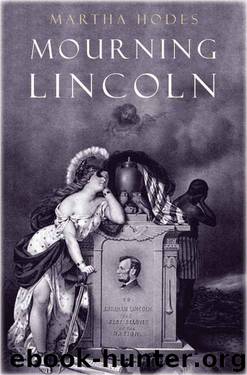Mourning Lincoln by Martha Hodes

Author:Martha Hodes [Hodes, Martha]
Language: eng
Format: epub
Publisher: Yale University Press
Published: 2015-02-23T22:00:00+00:00
Jefferson Davis, dressed in hoopskirt and military boots, hangs above an open grave. This 1865 cartoon lithograph, entitled “Freedom’s Immortal Triumph!” and “Finale of the ‘Jeff Davis Die-Nasty,’” shows a glowering sour apple tree upon which nooses await “Confederate Mourners,” with Robert E. Lee first in line and John Wilkes Booth bringing up the rear. The ground is littered with broken artillery, skulls, and copperhead snakes, while the figures of Liberty and Justice hover above. A man breaking the chains of slavery stands between a grieving soldier and sailor, and angels escort President Lincoln to heaven.
LC-USZ62-88772, Prints and Photographs Division, Library of Congress.
Levity aside, there remained the matter of Jefferson Davis’s fate. “Shall not his life atone (however poorly) for Abraham Lincoln’s?” asked one mourner. The death of Davis, thought another, would “in a small measure compensate us for the loss of our beloved President.” Edgar Dinsmore hoped to see him hanged—”fitted with a hempen cravat,” as he phrased it, “cut in the latest fashion.” Drawing on a verse from the song “John Brown’s Body” (Hang Jeff Davis to a sour apple tree), runaway slave William Gould hoped the apple tree would be “all ready.” The song from which Gould repeated these lyrics was enormously popular with Union soldiers; all embraced the message of fighting and marching onward, while the antislavery men among them reveled in portraying the executed white leader of the failed 1859 slave uprising as inspiring them from his grave. Abolitionist mourners made the same claims for President Lincoln: slavery had caused his death, and his death would inspire black equality. The Confederate president, by contrast, should be hanged as a traitor, and an effeminate one at that. Fourteen-year-old Sarah Putnam wanted Davis not only executed but also, she wrote in her diary, “roasted, starved, burnt, and skinned.” Abolitionist Lydia Maria Child, who opposed capital punishment, decided that as long as execution was legal, Davis should suffer that way, or else “no other man in the country ever ought to be hung.”34
Download
This site does not store any files on its server. We only index and link to content provided by other sites. Please contact the content providers to delete copyright contents if any and email us, we'll remove relevant links or contents immediately.
| American Revolution | Civil War |
| US Presidents |
Fanny Burney by Claire Harman(26603)
Empire of the Sikhs by Patwant Singh(23086)
Out of India by Michael Foss(16853)
Leonardo da Vinci by Walter Isaacson(13336)
Small Great Things by Jodi Picoult(7141)
The Six Wives Of Henry VIII (WOMEN IN HISTORY) by Fraser Antonia(5515)
The Wind in My Hair by Masih Alinejad(5095)
A Higher Loyalty: Truth, Lies, and Leadership by James Comey(4964)
The Crown by Robert Lacey(4817)
The Lonely City by Olivia Laing(4802)
Millionaire: The Philanderer, Gambler, and Duelist Who Invented Modern Finance by Janet Gleeson(4478)
The Iron Duke by The Iron Duke(4356)
Papillon (English) by Henri Charrière(4274)
Sticky Fingers by Joe Hagan(4198)
Joan of Arc by Mary Gordon(4110)
Alive: The Story of the Andes Survivors by Piers Paul Read(4032)
Stalin by Stephen Kotkin(3965)
Aleister Crowley: The Biography by Tobias Churton(3640)
Ants Among Elephants by Sujatha Gidla(3467)
